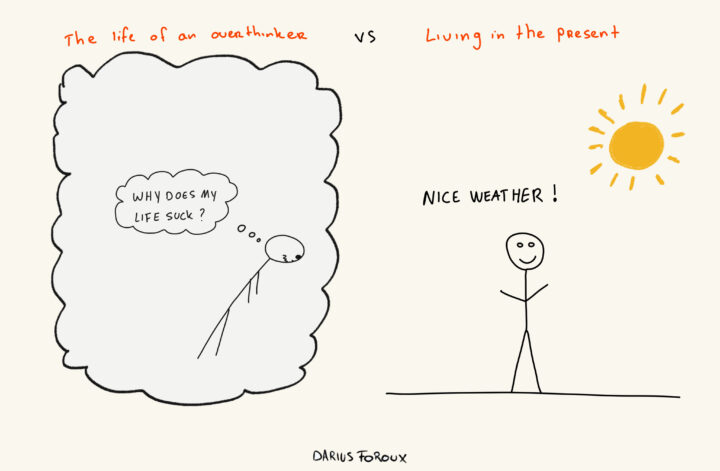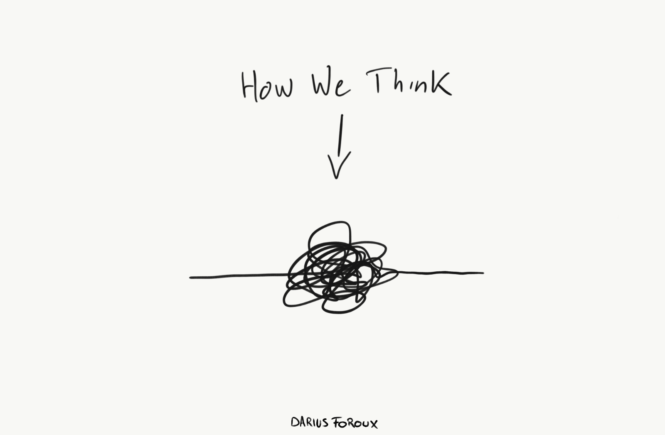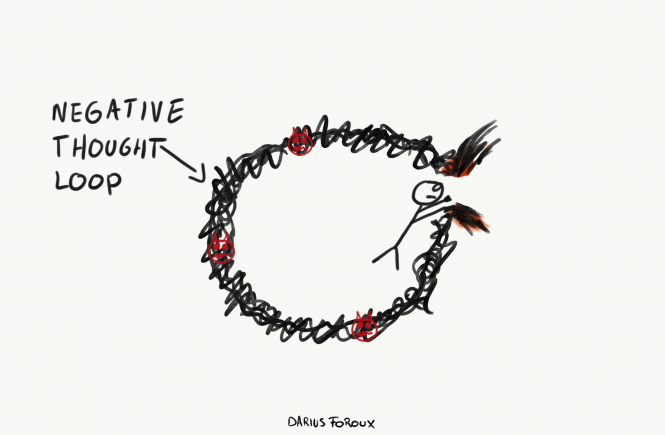If you’re anything like me, you spend A LOT of time thinking, reflecting, and trying to make sense of everything. Some call it overthinking; I call it wasting time.
This is the problem of deep thinkers: people who are conscientious, thoughtful, and considerate. But you’re not being thoughtful at all.
You’re actually destroying your own life.
You’re always thinking about the future, the past, or things that don’t even matter.
- What does so-and-so think of me?
- Why did he say that to me? What does he mean?
- Did you see what she did?
- Why does my boss not look at me in meetings?
- What’s wrong with me? I want to lie in bed all day.
- Everyone in this restaurant is looking at me.
- I’m not good enough.
You create entire movies in your mind that are so far from reality that YOU are disconnected from reality.
Your whole life is passing by in front of you.
And you’re so busy thinking about all kinds of things that you’re not aware of it.
I’m talking from experience as a perpetual overthinker. But there’s a way to manage that voice inside your head.
The overthinking monster: No one’s safe
I consider myself an advanced student of philosophy and meditation. I’ve been reading philosophy since I was 17, and I’ve been seriously practicing Stoicism and Mindfulness for almost a decade now.
And I’ve written about these topics a lot since then—dozens of articles and even entire books (Win Your Inner Battles, Think Straight, and Focus on What Matters).
Despite all this knowledge of philosophy and knowing what I “should” do, I still get caught in bouts of excessive thinking.
During these moments, I no longer observe my thoughts and live in the present moment; my thoughts consume me.
In the past, I was permanently stuck in that state of mind. It’s not uncommon. Most people live their lives as slaves to their thoughts.
But these days, there are more people interested in philosophy, meditation, Stoicism, and Mindfulness. These practices will help you to “wake up.”
When you start observing your thoughts, you can finally break free from the trap of overthinking. But no matter how mindful you are, you can always relapse.
And it can happen at any time. But you’re particularly prone to overthinking if there are a lot of things going on in your life that you don’t control. So you start thinking about “what ifs.”
Once you start doing that, you’re lost.
That happens to me too. But the power of knowledge is that you’re able to become aware of your own destructive behavior.
Getting grounded: The key to stop overthinking
You know, the biggest benefit of all this personal growth stuff we do is that it actually works.
For example, Stoicism teaches you how to deal with the difficulties of life. Buddhism and Mindfulness teach you the same. When you’re learning about these things, you might not need them.
But as we all know, life is hard, and it’s only a matter of time before we have to deal with difficult things.
Losing a loved one. Getting fired. Breaking up. Dealing with illness. You name it. We will all face those things at some point.
And when we face challenges, we have tools in our arsenal that help us get grounded.
That’s all you need to do when you’re experiencing inner turmoil.
The key to overcoming overthinking is not only about awareness. Yes, being aware of your thoughts is important. This is the starting point of waking up.
You must become the observer of your thoughts.
But it’s also about understanding your nature.
The craving mind: Why we’re always restless
First, we must accept the nature of our mind, which is restless. You simply can’t expect that you will ever reach a permanent state of bliss.
Many people think that experienced meditators get to this magical mental state of mind at some point. In that magical state, there’s no worry or overthinking. That’s a misconception.
As long as you live, you will have to deal with your restless mind. Your mind’s goal is to stir up some trouble up there. Your goal is to manage the trouble.
You see? There’s your “mind,” and there’s “you,” which are two different things. Some people call the “you” the soul or being.
The point is that you must acknowledge that you are NOT your thoughts. Your thoughts simply appear in your consciousness. You are the one who’s observing the thoughts.
This is the key to waking up and making sure you stop overthinking.
All this that I’m describing is a process. It’s the same thing with your weight.
No single human being has the same body weight every single day. Our weight fluctuates based on what we eat, drink, do, and how we sleep.
The same thing applies to your state of mind: It’s in constant movement.
Your mind constantly craves experiences and pleasure. Your mind is the cause of why you try to chase what you desire and try to avoid what you fear.
Accept and wake Up!
If you want to have inner peace, you need to be a light and fluid person who doesn’t hold on to thoughts. Your soul needs to be clear and new at every moment.
Don’t hold on to any judgments about yourself or the world. Forget about all the verbal concepts in your mind.
- “I had a tough childhood.”
- “I was bullied in school.”
- “Every single thing I tried in my career didn’t work out.”
- “I’m weak because I can’t stick to my habits.”
Stop it. Stop all of it!
Every single moment, you are a new person. You have a new chance to experience life.
What we do is endure. That’s not living.
When you tune out your thoughts and live in the present, you can only do one thing: experience the thing that’s in front of you.
Enjoy.




